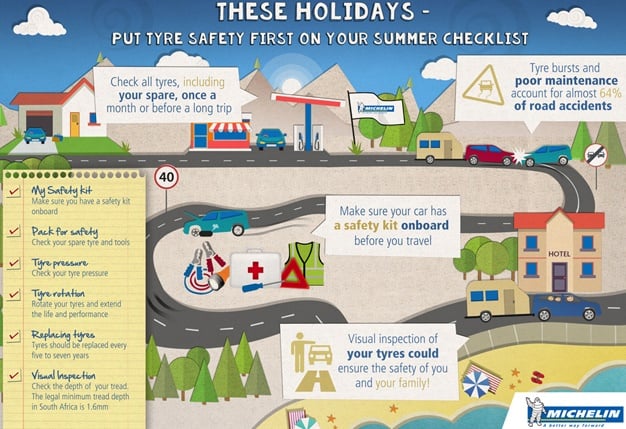Cape Town - It's that time of year again when friends and families embark on a long-awaited Easter holiday. Vehicle checks are vital and could prevent loved ones from becoming statistics on South Africa's dangerous roads.
In 2015, the Easter weekend saw a high number of deaths on our roads, despite the efforts of law enforcement. Spokesperson for the Western Cape transport MEC Siphesihle Dube said most road deaths were pedestrians.
The preliminary Easter weekend road death toll in 2015 - 287 from 208 crashes represented a 48% increase compared to the 2014 Easter death toll of 193 from 148 crashes.
Vehicle checks you should perform before you head off on your journey: Info by Tiger Wheel & Tyre and Michelin Tyres SA
1 Before you leave
Before beginning a long drive always ensure you get enough sleep the night before. Make sure to do a quick inspection of the car before leaving the house, make sure the tyres are properly inflated and all fluids are at their proper levels.
2 Assemble a road safety kit
Whether your journey is long or short, it pays to be prepared for any emergency. Make sure you have the following items in your car in case you run into some difficulty; a first aid kit, a flashlight, basic tools and your locknut key, if you have one, a reflective triangle, your car manual, jumper cables, a charged cell phone and cell phone charger. Also remember to pack a detailed map of your route, as technology is not always reliable!
READ: Planning an SA road trip? 20 vehicle checks you must do!
3 Always be prepared to change a tyre
Every driver of a vehicle should know how to change a tyre. Unfortunately, this is not always the case in South Africa and stopping to help someone in trouble has become a safety issue and not many people are willing to do it.
Therefore it is highly recommended that you sign up for roadside assistance before long journeys. Rather sit and wait for help then get out of your vehicle and risk your safety, especially at night.
4 Practice defensive driving
We all know that prevention is better than cure, so it is wise to practice defensive driving.
Avoid drinking and driving, or driving when tired or drowsy, keep a distance of three cars between you and the car in front of you, drive more carefully in bad weather and, avoid getting into confrontations with other drivers on the road. Also remember to pull over and take breaks every couple of hours, it may not feel necessary but it is imperative to break your concentration every so often. Also if you can, share the driving responsibilities with someone else.
5 Have a list of all necessary contacts
Other than the South African emergency number 112 which can be dialed from any cell phone, you should also know the numbers for your insurance company and roadside assistance. Make sure you have your membership numbers available and it is a good idea to keep a written list of all this information in case your cell phone battery dies.
6 Buckle up!
A tip that should go without saying, make sure everyone in the car buckles up!
Michelin South Africa marketing manager, Luc Fayolle, says: "When it comes to your safety, your tyres are critical. To get the most out of your tyres in terms of maximum mileage and safety, you'll need to maintain them properly. Keep in mind that insurance companies will not pay out any claims if tyres are deemed unroadworthy, regardless if the incident was a result of the tyres or not."
7 Pack for safety
Check that you have a spare wheel in the boot that is pumped up to the correct air pressure and is not punctured. Remember that most spare tyres can only go about 80km/h and not further than 100km. Make sure you have the correct tools, should you have to change a tyre such as a jack and lug wrench. Depending on your make and tyres, you may also need a wheel lock, extension bars for lowering the spare tyre and alignment studs.
8 Tyre pressure
Tyres have been known to lose up to 0.06BAR (the metric unit used to determine pressure) every month. Tyre pressures should be checked when the tyres are 'cold'. This should be done before you drive, or a maximum of 3km or at least 3 hours after you have driven. Remember tyre pressures might differ when pulling or carrying a load.
9 Rotation, rotation!
Regular rotation helps extend the life of your tyres and improve performances. Tyres should be rotated every six months or every 8000 to 10 000km.
10 When to replace tyres
Did you know tyres should be replaced every five - seven years, depending on how much you drive. Caravan and trailer tyres should be replaced regularly as well, even if only used once or twice a year. Ensure your tyres are the same size and type as your current tyres. New tyres provide better wet grip than worn tyres.




 Publications
Publications
 Partners
Partners












